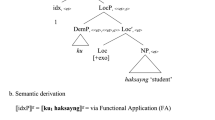Abstract
The paper addresses the widely held position that the Third Man regress in theParmenides is caused at least in part by the self-predicational aspect of Plato's Ideas. I offer a critique of the logic behind this type of interpretation, and argue that if the Ideas are construed as genuinely applying to themselves, then the regress is dissolved. Furthermore, such an interpretation can be made technically precise by modeling Platonic Universals as non-wellfounded sets. This provides a solution to the Third Man regress, and allows a consistent reading of both self-predication and the singularity of the respective Forms.
Similar content being viewed by others
Author information
Authors and Affiliations
Rights and permissions
About this article
Cite this article
Schweizer, P. Self-predication and the Third Man. Erkenntnis 40, 21–42 (1994). https://doi.org/10.1007/BF01128714
Received:
Revised:
Issue Date:
DOI: https://doi.org/10.1007/BF01128714




